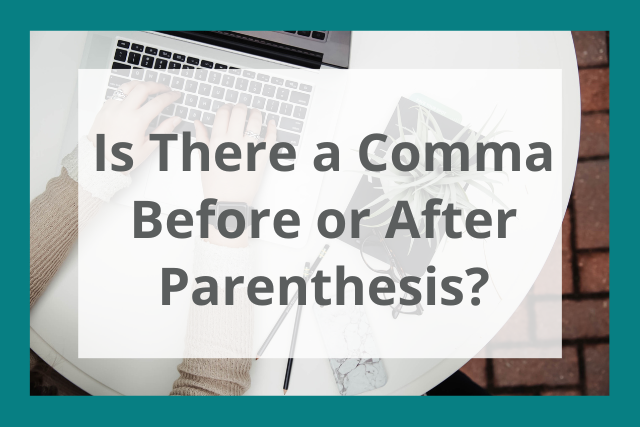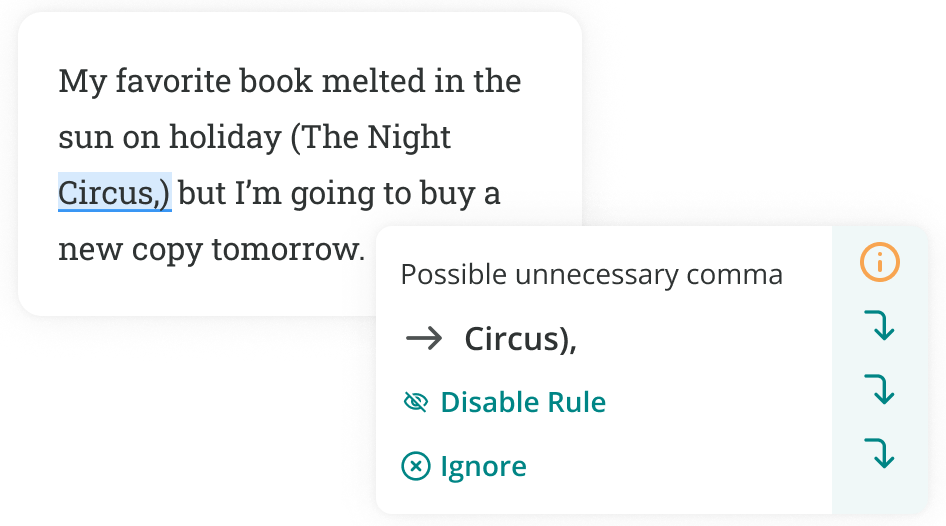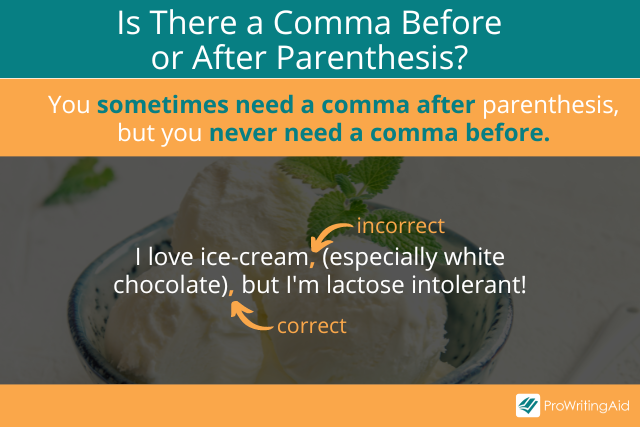
English comma rules can be confusing. Even the most confident writers sometimes struggle to remember when and how to use them.
For example, should you use a comma before or after parentheses?
Generally, you should only use a comma outside a closing parenthesis, though there are some exceptions to this rule.
In this article, we’ll teach you when and how to use a comma with parentheses and show you some examples of it in action.
Quick Summary of Parentheses Punctuation
Parentheses are a pair of round brackets ( ) used to separate a parenthetical word or phrase from a sentence. They’re used to enclose additional information in a sentence, or show that the information is an aside.
Let’s look at when to use punctuation inside parentheses.
If the information inside the parentheses contains a list, you should separate the items with commas.
- I love my pets (parrots, cats, and fish), but I’m not allowed to keep them in my new apartment.
If the parenthetical expression is a complete sentence that requires a period at the end, then the period should go inside the parentheses. Exclamation points and question marks that are part of the parenthetical material should also go inside the closing bracket.
- Your sick brother (Eric’s contracted shingles!) wants you to visit.
However, if the information inside the parentheses doesn’t form a complete sentence, you shouldn’t include a period inside the closing bracket.
When the parenthetical element occurs at the end of the sentence, the period should go outside the closing parenthesis to bring the sentence to a close.
- Please read the analysis (you’ll be amazed).
Want to make sure grammatical errors don’t sneak into your work? ProWritingAid can highlight incorrect uses of punctuation inside parentheses in your writing.

Do You Need a Comma After Parenthesis?
Parentheses don’t always need to be followed by a comma, but there are some instances where it is grammatically correct to do so.
You should use a comma after the closing parenthesis if the sentence would need a comma without the parentheses.
Here are the instances where it’s suitable to use a comma after a parenthesis:
1. When the parentheses are part of the introductory statement
An introductory phrase is a clause without a subject and verb. It is typically followed by a comma, which shows that the main idea of the sentence is yet to come.
If a parenthetical element is a part of the introductory phrase, a comma will come after the closing bracket.
- Around this time of year (between August and September), Susan liked to go abroad.
2. When the parentheses are part of a compound sentence
A compound sentence is made up of two independent clauses joined by a coordinating conjunction (for, and, nor, but, or, yet, or so) and a comma.
If parentheses are introduced at the end of the first independent clause, a comma will follow the closing parenthesis. This is because the comma would’ve been part of the sentence regardless.
- Mary lost her necklace (for the fourth time), but luckily her mom was there to help.
3. When the parentheses are part of a complex-compound sentence
Complex-compound sentences comprise two or more independent clauses and at least one dependent clause.
A comma or pair of commas normally offset a dependent clause. If parentheses follow the dependent clause, a comma will follow the closing parenthesis.
- The cat, who work me up every morning to be fed (and who I fell in love with), finally let me stroke her!
A helpful way to remember the correct usage is to look at the sentence as a whole. If you removed the parentheses, would there still be a comma? If the answer is yes, you should include a comma after the closing bracket.
For example:
- The sun is shining through the clouds (a rare sight), so I think we should go swimming with the neighbors.
Written without the parentheses, this sentence still requires a comma to separate the clauses.
- The sun is shining through the clouds, so I think we should go swimming with the neighbors.

Examples of Commas Used After Parenthesis
Here are a few examples of commas used after a closing parenthesis in a sentence:
- To put it simply (it’s not rocket science), there was no way that he could have won without cheating.
- We told him to come at six o’clock (he’s always late), but he still arrived hours past that.
- A warm welcome to all (especially the long-time fans), and now I ask you to turn your phones off as we start the show.
- The mystery of the missing necklace, which had plagued Ann’s mind (and caused her considerable heartache), had finally been solved.
- Although their parents were sure they’d be fine (they were responsible kids), they still asked that they keep their phone locations turned on.
- I haven’t decided if I want to go to the party (especially on a school night), but I’ll go with you if you want me to.
Do You Need a Comma Before Parenthesis?
In most instances, it’s not grammatically correct to use a comma before parentheses. Take a look at the examples below:
Incorrect: Jamaica has some of the Caribbean’s most beautiful beaches, (especially in Negril) but many of them aren’t well known by the public.
In this sentence, the comma should come after the closing parenthesis.
Correct: Jamaica has some of the Caribbean’s most beautiful beaches (especially in Negril), but many of them aren’t well known by the public.
When NOT to Use a Comma with Parentheses
If a sentence doesn’t require a comma, then you shouldn’t include one when you add parentheses. For example:
- I don’t believe she’s telling the truth (she never does).
- He took so many blankets (enough for everyone) to the picnic.
- Kate (an only child) grew up needing a lot of attention.
- James cleaned his bedroom (complaining all the while) before he went to play football.
Comma Before or After Parenthesis: Conclusion
The standard rule is that commas should not be used before parentheses. Commas can be used after the parenthetical element if they would’ve been part of the sentence structure already.
A good way to decide if you should use a comma after the closing parenthesis is to remove the parentheses and see if the sentence still requires a comma.



